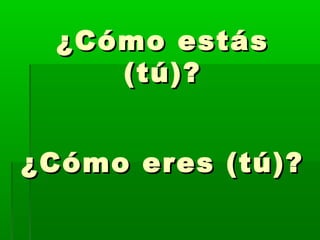
Adjetivos
- 1. ¿Cómo estás¿Cómo estás (tú)?(tú)? ¿Cómo eres (tú)?¿Cómo eres (tú)?
- 2. ¿Cómo eres (tú)?¿Cómo eres (tú)? (yo) Soy…(yo) Soy…
- 3. ¿Cómo es (ella)?¿Cómo es (ella)? (ella) Es…(ella) Es…
- 5. los adjetivoslos adjetivos uso adjetivos para describiruso adjetivos para describir
- 6. WhatWhat’’s to know?s to know? Masculine and feminine nouns and adjectives.Masculine and feminine nouns and adjectives. Agreement in number.Agreement in number.
- 7. Spanish uses nounsSpanish uses nouns that are eitherthat are either feminine or masculine.feminine or masculine. The nouns also changeThe nouns also change to be singular andto be singular and plural.plural. (number)(number)
- 8. The end of a nounThe end of a noun usually signifies theusually signifies the gender.gender. -a -o female male
- 9. TheThe ““ss”” at the endat the end shows a plural noun.shows a plural noun. -as -os Feminine plural Masculine plural
- 10. In Spanish the adjective agrees with the noun it describes in gender. The adjectiveThe adjective bonitobonito will change towill change to bonitabonita when used to describe awhen used to describe a nounnoun which is feminine.which is feminine. elel vestidvestidoo bonitbonitoo lala camisetcamisetaa bonitbonitaa
- 11. In Spanish the adjective agrees with the noun it describes in number. The adjectiveThe adjective alto/aalto/a willwill change tochange to altos/asaltos/as whenwhen used to describe moreused to describe more than one noun.than one noun. plural forms (+1):plural forms (+1): loslos amigamigosos altaltosos laslas casas altcasas altasas singular forms (1):singular forms (1): elel amigamigoo altaltoo lala cascasaa altaltaa
- 12. Examples: Juan es alto. Pedro es tonto. Gloria es delgada Rosa y Andy son inteligentes.
- 13. When both masculine and feminine nounsWhen both masculine and feminine nouns are described by one adjective theare described by one adjective the masculinemasculine form is used.form is used. Juan es alto.Juan es alto. Julia es alta.Julia es alta. Juan y Julia son altJuan y Julia son altosos..
- 16. Los abuel son simpátic y viej os os os
- 17. altos alta bajo
- 18. bonita bonitos
- 19. ¡INTENTALO!¡INTENTALO! Ramón es _______. Gloria es _______. Los amigos son ________. Jorge es ______. bajo guapo rubia buenos guapo rubia buenos bajo
Notas del editor
- A word ending in “a” usually shows feminine, “o” signifies male.
- Similar to English.
- The examples show the difference between male (el vestido bonito) and female (la camiseta bonita).
- The first examples show the plural version of female and male. The second example show the singular form.
- Notice the difference between each example. Male/Female and Singular/Plural
- In short remember that the male dominates (grammatically speaking).
- Notice that the article, noun, verb and adjectives all correspond with each other. (article – el, abuelo – noun, verb – es, adjectives – simpatico, viejo)
- The “a” represents a feminine gender. (article – la, noun – abuela, verb – es, adjectives – simpatica, vieja)
- Here the gender is male (because the male dominates) and each word is plural. (article – los, noun – abuelos, verb – son, adjectives – simpaticos, viejos)
- Notice the difference between each example and why the word ends with “a”, “o” or “os/as”.
- Notice the difference between each example and why the word ends with “a”, “o” or “os/as”.
- Click to reveal the answer. Some answers can be interchanged. Identify which ones can have different answers.
